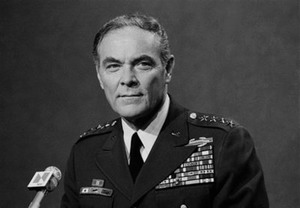Asia-Pacific
Former Nixon aide, Alexander Haig dead at 85
(Agencies)
Updated: 2010-02-21 09:00
 |
Large Medium Small |
WASHINGTON: Alexander Haig, a former Army general who became White House chief of staff during the Watergate scandal and secretary of state during the Reagan administration, died Saturday at the age of 85.
|
 In this March 21, 1978 file photo, Gen. Alexander Haig, speaks at a Pentagon news conference on in Washington. Haig, who served Republican presidents and ran for the office himself, has died, Saturday, Feb. 20, 2010. [Agencies] |
Haig sought the US presidency, but his bid for the Republican nomination ended in failure in 1988, a campaign noted for his acerbic taunting of other candidates including Vice President George H.W. Bush, the eventual winner.
A spokesman for Johns Hopkins Hospital in Baltimore said Haig died early Saturday from a staph infection acquired prior to his arrival at the hospital.
Symbolically, the closest Haig came to being president was when he proclaimed to the news media that "I'm in control here" after President Ronald Reagan was shot in an assassination attempt in 1981.
Critics called that statement, which seemed to incorrectly state the line of presidential succession, pompous and militaristic and used it against him later on the campaign trail.
President Barack Obama, a Democrat, praised Haig on Saturday as a "great American" who served the United States with distinction. "General Haig exemplified our finest warrior-diplomat tradition of those who dedicate their lives to public service," Obama said in a statement.
"Our thoughts and prayers are with his family," he added.
Haig secured a place in American history by holding the presidency together in 1974 during the months leading up to Richard Nixon's resignation in the Watergate scandal.
Telling friends that "when your president asks, you do it," he had reluctantly resigned as Army vice chief of staff in May 1973 to take over the top White House staff job at a time when Nixon's administration seemed to be drifting out of control.
For many years, Haig's name was one often mentioned as being "Deep Throat," the legendary Washington Post source who had helped bring down Nixon. In 2005, former FBI official Mark Felt broke his silence and confirmed that he was the mysterious source.










